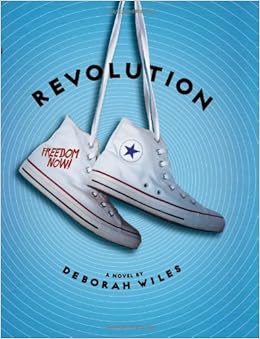 Revolution
RevolutionDeborah Wiles
Scholastic, 2014 479 pgs
Grades 6-Up
Historical Fiction
The second installment in her "The Sixties Trilogy", Wiles once again offers a hybrid novel/photo-essay, this time turning from the Cuban Missile Crisis to Freedom Summer in Mississippi in 1964. On the cusp of thirteen, Sunny's summer is filled with swimming in the pool, hanging out with friends, and the Beatles. All of this changes when "the invaders" set up camp in her small town in Greenwood, Mississippi. Civil Rights leaders and volunteer college students have arrived en-mass to educate the African American population and register them to vote, despite the existence of Jim Crow laws, trumped up reasons why African Americans cannot register, and resistance from local police and town's people. Sunny and her step brother encounter a young African American boy of their own age, Raymond, and his story is interwoven with Sunny's. We see Raymond grow from an apathetic teenager to a soldier in freedom's army, peacefully attempting admittance to "white's only" venues, eventually getting brutally beaten and then refused treatment at the local hospital. Sunny matures from a little girl to a young lady, learning to see other people's points of view, as well as growing to except a new step family. Sunny begins to question the way of life that she has always known and finds her inner strength to stand up for what is right. The book winds down with the summer. School begins again and Greenwood has settled down a bit. Change has started and there is no going back.
Revolution is a stunning book in both content and design. Our two parallel stories (on different shades of paper to determine who is narrating) are interspersed with emotional and original photos from the time and place, original documentation and first person accounts (again in different type-set in order to not be confused with the fiction), and relevant poetry and song lyrics from the time period. The result is as close to a "slice of life" you can get to being there. I did not buy this book (or its predecessor) for my library because it looks like a shelf sitter: it is too long and seemed boring. What do kids care about the Cuban Missile Crisis and Freedom Summer? Being from New Jersey I felt that what was happening in 1960's Mississippi is not our story, I was so wrong. Revolution is consuming and very readable. It is impossible to put down once you begin and makes the reader want to know more. It is mind-blowing that American citizen's had no rights based on skin color as recently as fifty years ago. Wiles clearly did her research. Original documentation is all through the book and an extensive bibliography is included. This book is Newbery worthy. Unfortunately, the Newbery medal cannot take into account any illustrations or photographs. The photos really give the book a visual punch, placing the reader into the time and place. The story is strong enough on its own to be a contender and I hope that the committee is able to see past the visuals. The characters all experience growth throughout the summer and are faced with important choices. We see all sides of the conflict and Wiles doesn't offer easy answers. At the end of the book a major character is sent to the growing conflict in Vietnam and it concludes with photos and song lyrics from the war, so I think that is where the trilogy will be heading next. I can't wait!
No comments:
Post a Comment